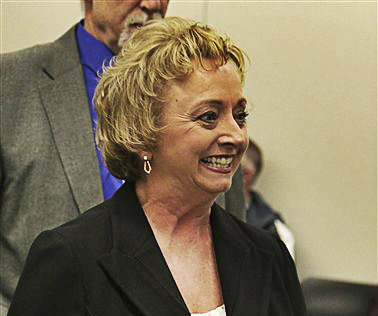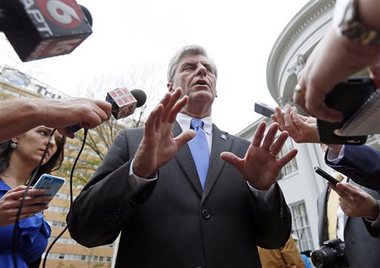

JACKSON, Mississippi (AP) — If you’d like to know a little something about Mississippi’s next superintendent of schools, Carey Wright, you should thank Des Moines, Iowa.
When Wright interviewed for the superintendent of that local school district in March, she and two other candidates met with members of the community and then gave speeches and brief interviews with the board that were recorded. That 20-minute recording is still online. It gives a much better insight into Wright’s background and professional views than the one-paragraph statement she issued through the Mississippi State Board of Education after it voted in a closed meeting last week to name Wright the leader of the Magnolia State’s 490,000 students and 148 school districts.
When Wright interviewed in Omaha, Neb., in December, her name was again announced publicly and she took questions from community members after giving a presentation.
Contrast that to Mississippi, where the names of most of the five finalists are still unknown, Wright left town before she was publicly announced and it’s still not very clear why the board chose her over other candidates. Superintendents, lawmakers and education advocates say they’re hopeful Wright is a good choice, but the truth is most don’t know much about her.
Some people were consulted at the start of the process, asked to list the qualities they wanted in a superintendent. Board members say they were working off that list. But it would have been interesting to hear Wright explain how she fit the bill. Does she have a vision for Mississippi? Will people support her? If she’d given a speech and taken questions, there might be at least tentative answers.
To be clear, the Board of Education didn’t do anything illegal. Mississippi law allows secret applications as well as closed interviews, deliberation and votes. Search consultants emphasize how good secrecy is for an executive search, saying it brings in candidates who wouldn’t otherwise apply.
And yes, a public process means the board members making the appointments will be subject to public pressure. In Des Moines, Wright was passed over for an internal candidate. In Omaha, she was passed over for a superintendent from Kansas. In both cases, those boards probably made the safe choice.
Mississippi, like the rest of the Deep South, has a weak culture of informed public participation. The state’s 1890 constitution produced a shrunken electorate, reserving the province of public affairs for elites. While the voting restrictions of that system foundered on the rocks of the civil rights movement, government can still feel like the concern of a narrow few. In some places, citizens expect to be consulted — they even demand it.
There are other executive choices being made behind closed doors now. The College Board is interviewing candidates for the presidency of Mississippi Valley State University. Valley is the smallest of the state’s eight public universities, and arguably the most troubled, with enrollment dropping like a stone, no endowment to speak of, and alumni divided into factions.
The College Board typically names a single preferred candidate who meets with members of a university community before the board votes. That process does give more room for public participation. Presumably, if something bad emerged about a candidate’s background or the candidate said something embarrassing, the College Board might reject the candidate.
The state Board of Education might want to look at options for doing things differently in the future. Education leaders trumpet the need for community support of education. A broader public consultation in naming a new superintendent might help build that support.



